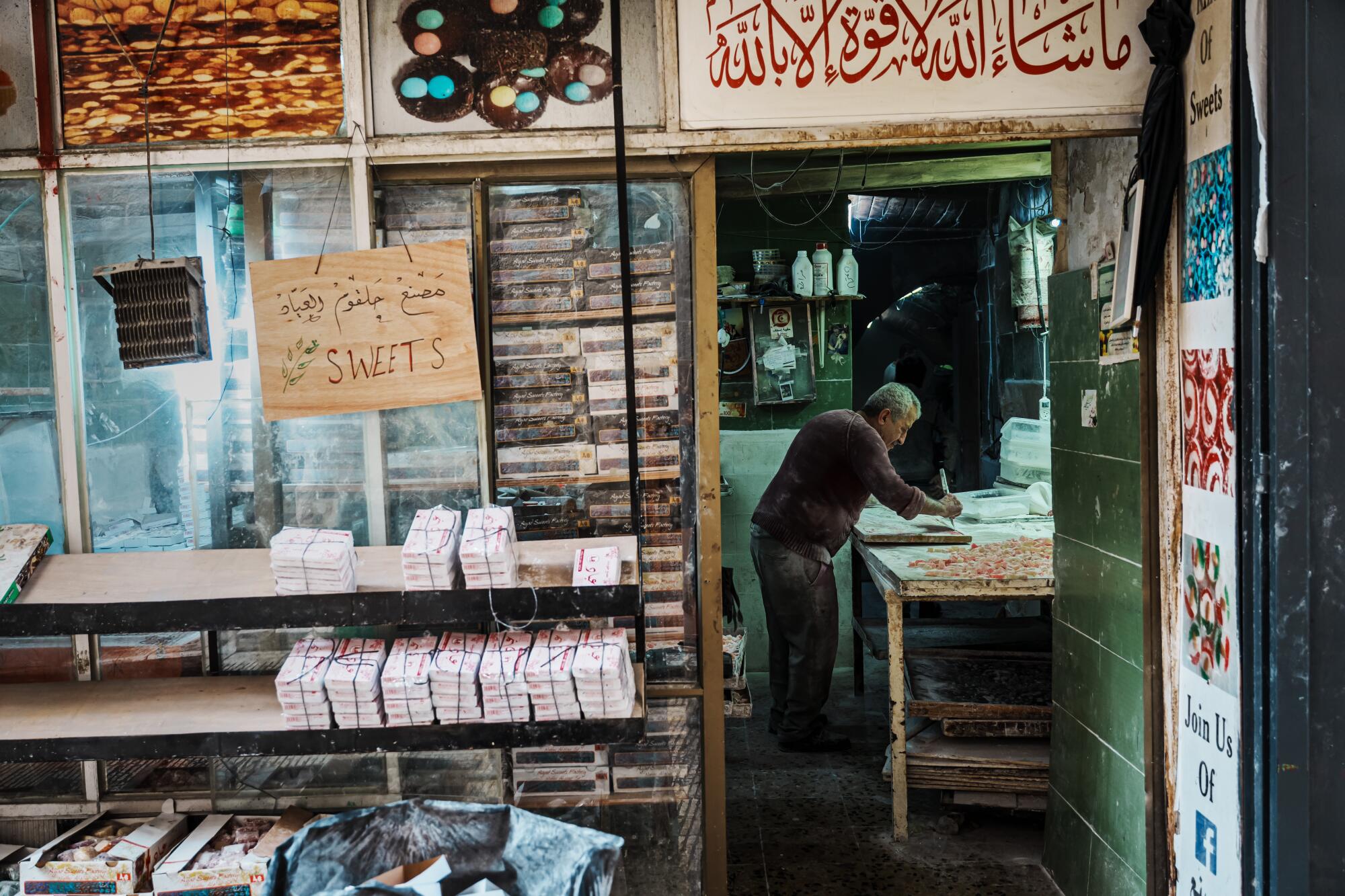
- Share via
NABLUS, West Bank — What Sacher torte is to Vienna, or kouign-amann to Brittany, or cannoli to Sicily, knafeh Nabulseyeh is to Nablus.
The teeth-achingly sweet pastry is almost synonymous with this ancient city, the dessert (and commercial) capital of the occupied West Bank. Big wheels of the almost fluorescent orange delicacy — essentially a syrup-drenched Palestinian cheesecake — glisten in bakery windows, luring in the hungry and sugar-starved.
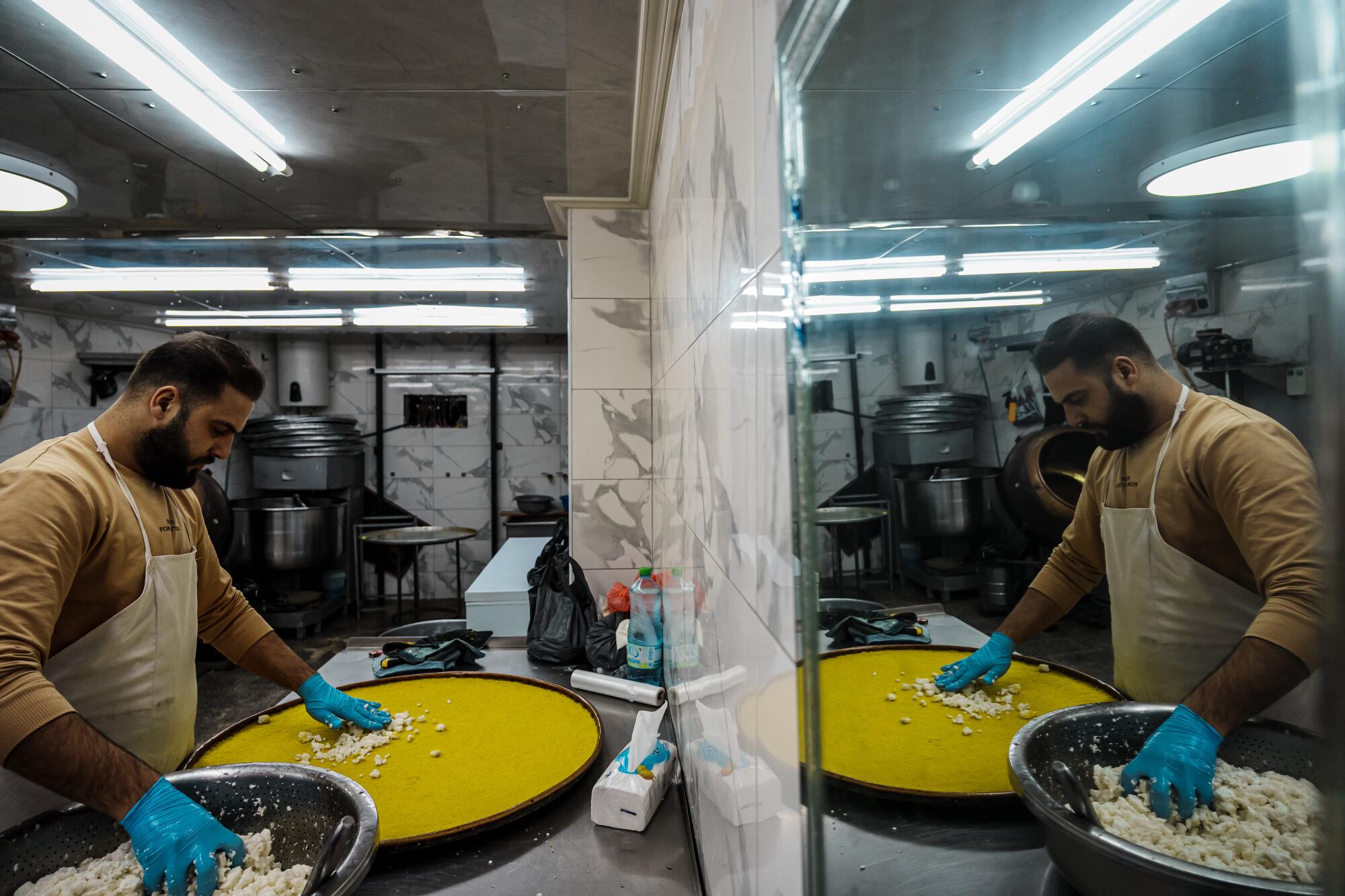
So it was little surprise to see a continuously replenishing crowd of customers lining up at Al Aqsa Sweets, Nablus’ most popular dessert maker, and watching Khaled Abboud slice pieces of knafeh with practiced aplomb. It seemed like brisk business as he emerged from the kitchen with a fresh 2½-foot-wide tray of knafeh every 10 minutes. But the burly 28-year-old server was unimpressed.
“This? It’s barely a third of what we’d normally sell,” he said, his spatula chop-chop-chopping a trapezoidal piece of knafeh — exactly 4.4 ounces as advertised, a scale showed — and handing it to a patron on a plastic foam tray. “With all that’s happening in Gaza, people just aren’t coming.”
The slump in Al Aqsa Sweets’ business reflects the economic malaise gripping the Palestinian economy as the West Bank reels from an intensified Israeli security campaign in the wake of Hamas’ Oct. 7 attack and the war in Gaza.
In November, the Palestinian National Economy Ministry recorded a loss of some $25 million a day as a result of Israeli military raids and settler attacks in the West Bank. Almost a third of businesses have fully or partially closed, while 94% logged sales of less than half of what they were before Oct. 7. Two-thirds have slashed their workforce.
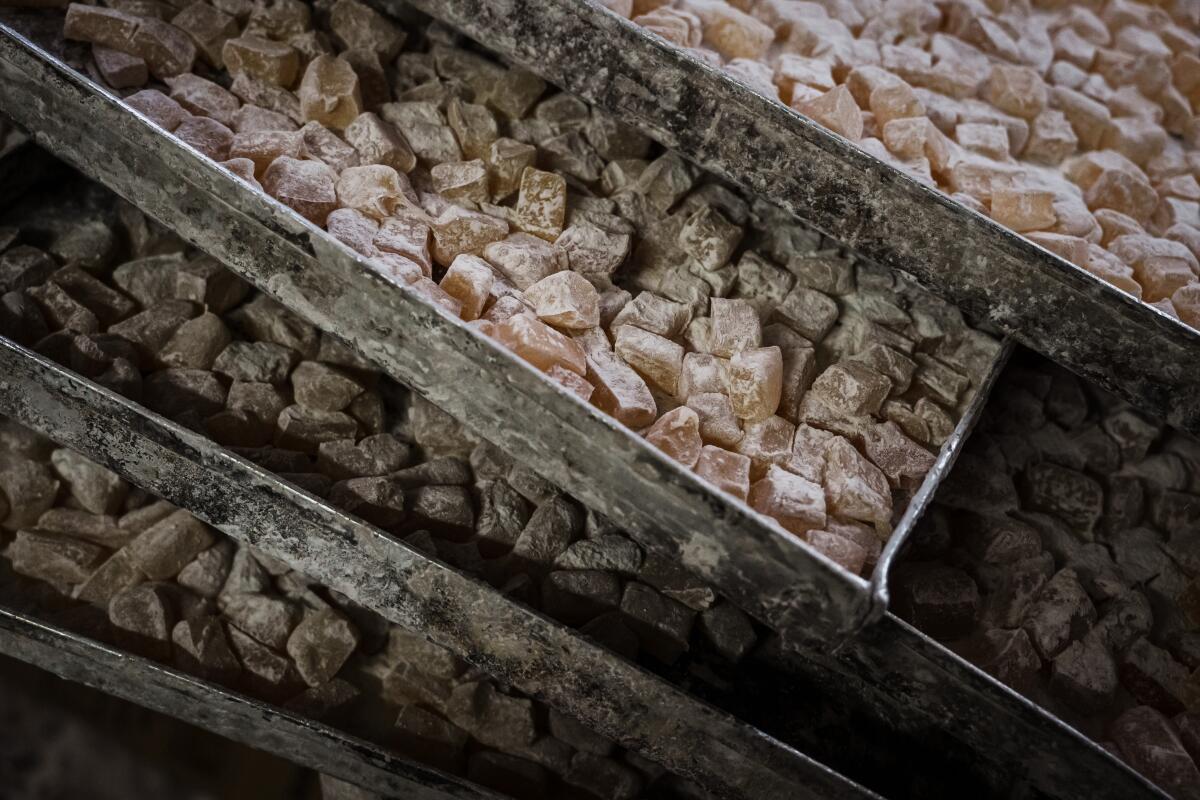
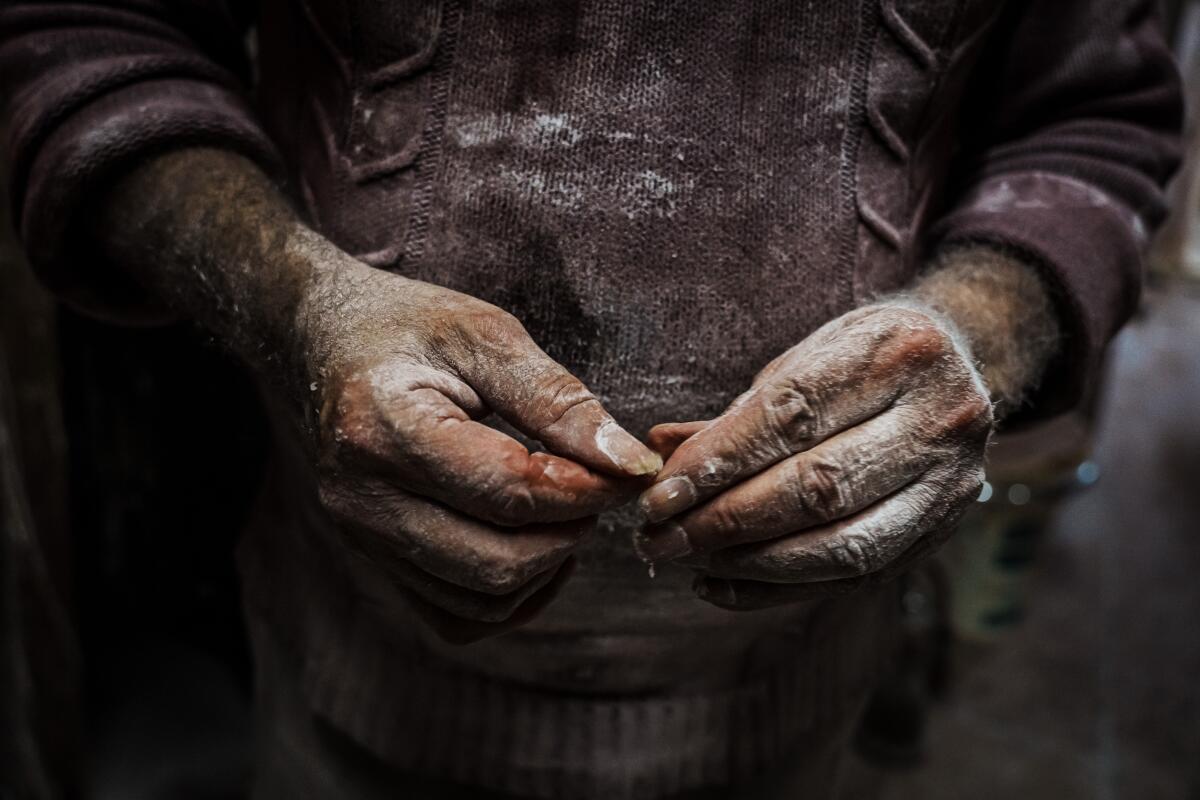
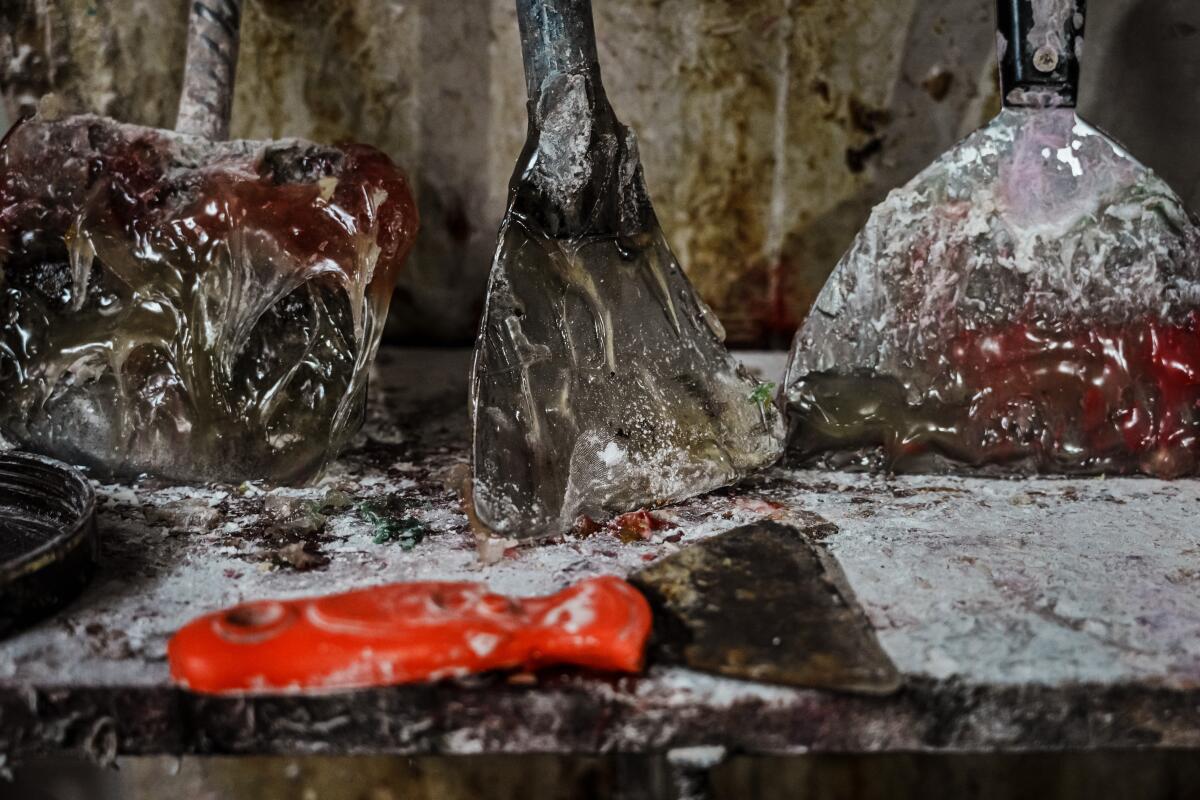
1. Trays of Turkish delight at the Ayad Sweets Factory in Nablus’ Old City in the occupied West Bank. 2. Powdered sugar covers the hands of shop founder Saleem Ayad. 3. Tools used for making Turkish delight.
“Of course we’ve cut back. I want to keep my people employed, but I’ve had to reduce their shifts to spread the work across all of them so none go hungry,” said Firas Isleem, the 34-year-old head chef and manager of the shop.
The war in Gaza, now in its third month, has also had a withering effect on Israel’s economy, wreaking havoc on a scale that dwarfs the financial impact of previous confrontations with Hamas.
The mobilization of some 360,000 reservists and evacuation of about 200,000 people in the south, near Gaza, and the north, near the Lebanese border, has led to the loss of 950,000 jobs, according to Israeli government figures. Estimates say the war is costing Israel $260 million every day.
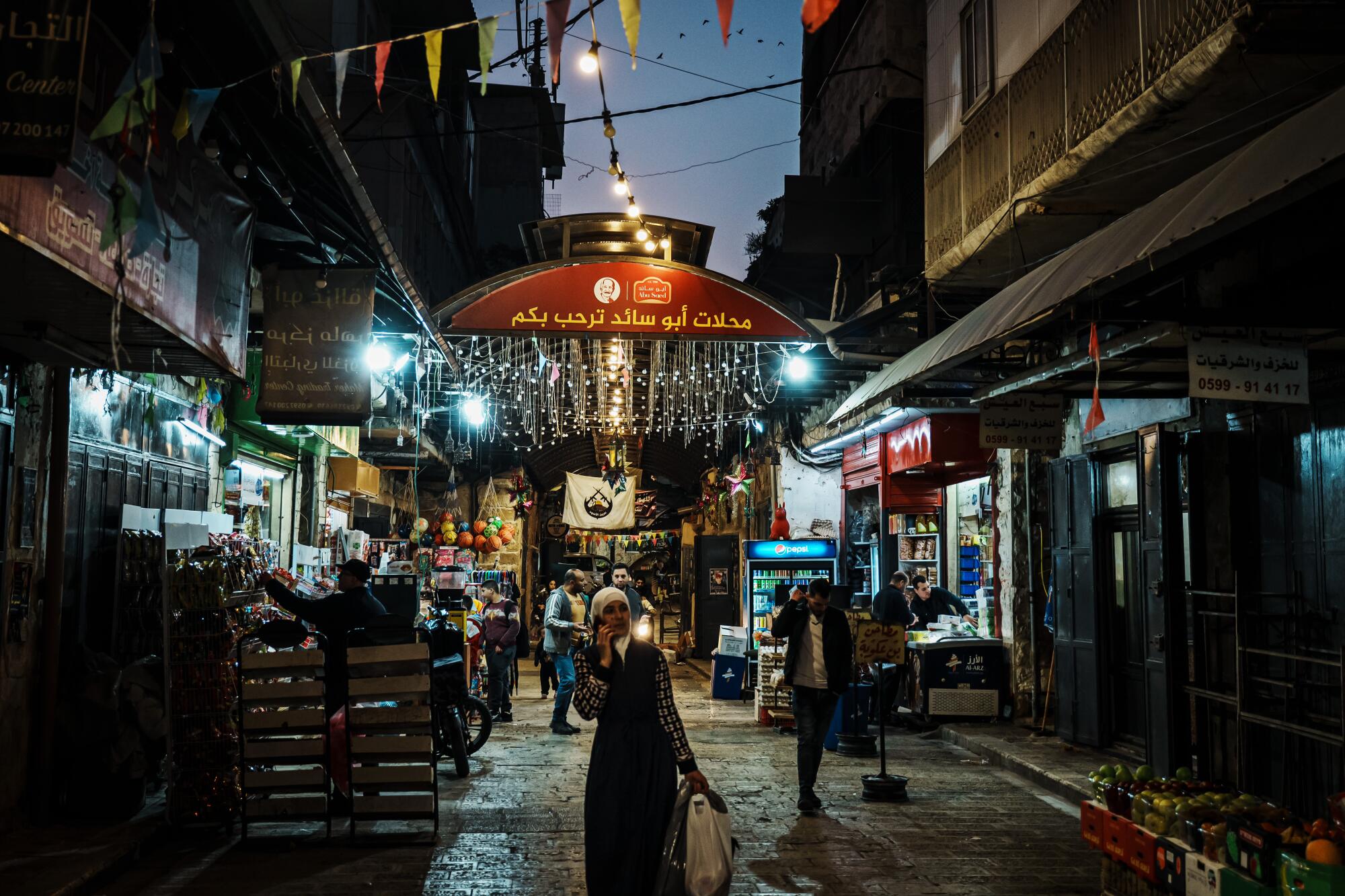
For Palestinians, running a business under occupation has long been difficult, with merchants forced to navigate around Israeli restrictions, incursions and checkpoints where Israeli soldiers can apprehend anyone and hold up or divert traffic for hours, paralyzing work at a moment’s notice. But Israel’s stepped-up operations in the West Bank have made those obstacles both more frequent and more severe, exacerbating the isolation of its major cities.
Nablus, for example, has seen its main southern entrance sealed, forcing motorists to take a circuitous 14-mile route over roads unsuitable for heavy transport. Its other primary entryway has a military checkpoint that can involve an hour’s wait.
“They’re strangling the city,” said Ziad Anabtawi, chief executive of the Anabtawi Group, one of Nablus’ top distributors of foods and international goods. He was alluding to the checkpoints that have popped up at the entrances to most villages and towns around Nablus, which Israeli troops have blocked with iron gates, earthen mounds, concrete blocks or other obstacles.
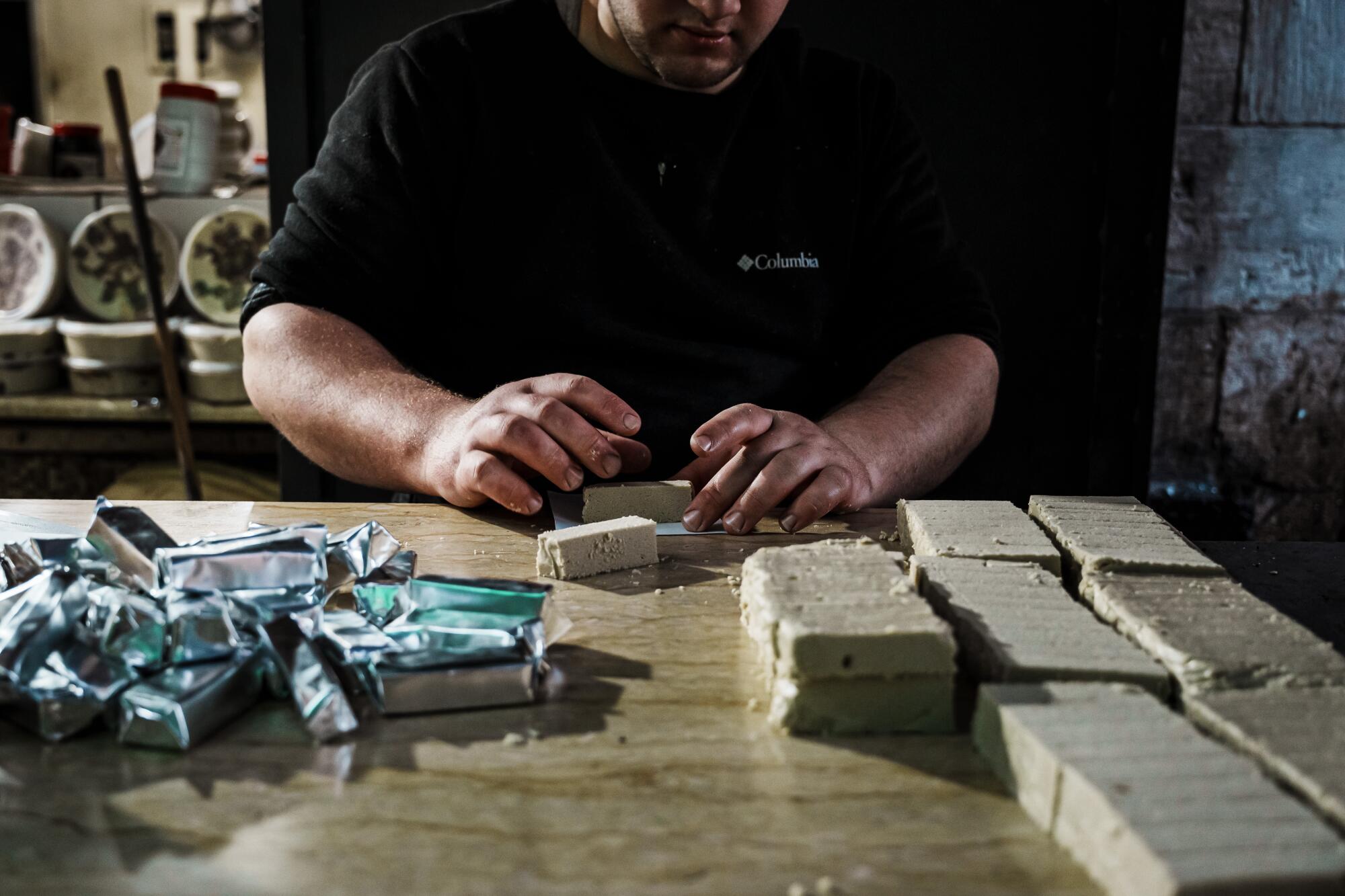
Where he once could count on a truck making two trips a day from Nablus to the southern West Bank city of Hebron, Anabtawi now considers himself lucky if a single shipment squeezes through. He’s watched his enterprises lose around a third of their sales compared with before the war.
“And those are the numbers for staples. For luxuries, you’re looking at a 90% drop,” he said.
The difficulties apply to small manufacturers too. Down a cobblestone street in Nablus’ Old City, at the entrance of the tiny two-room workshop of the Ayad Sweets Factory, Amjad Ayad stood slicing a sheet of strawberry-flavored Turkish delight into strips — part of an 8-ton shipment he used to send to Gaza every few weeks but that has since been canceled. The warehouse where it was to be stored was bombed in the Israeli offensive, he said.
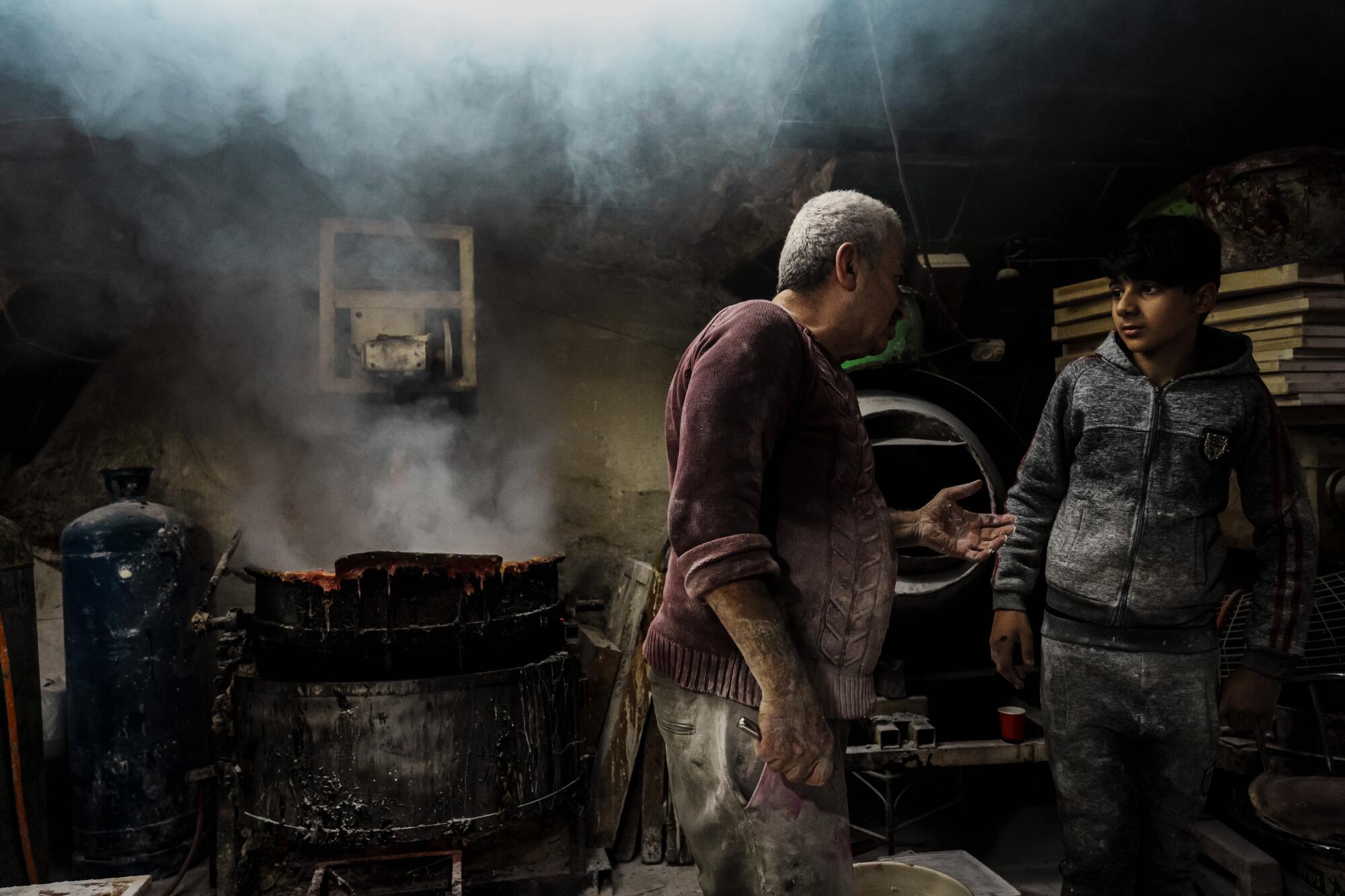
Ayad, 37, whose father, Saleem, founded the firm, is also unable to supply other regular customers, whether Palestinian Israelis or residents of East Jerusalem. Though Ayad has a commercial permit that authorizes him to cross from the West Bank into Israel to deliver his goods, “it wasn’t worth my safety to go,” he said.
“All of those orders — canceled. The amount you see here, it’s to keep us a little bit busy, but really it’s just to occupy our time,” he said, his face covered with so much starch to keep the Turkish delight from sticking to his skin that his black eyelashes had turned white. “As long as the passageways are closed like this, there’s no life.”
At Al Aqsa Sweets, Isleem discussed the ways that the war had pushed up the prices of most of his ingredients. Flour and sugar are up anywhere from $8 to $11 per bag. A can of ghee now costs an extra $7. At least cheese, sourced locally from nearby farms, was relatively unaffected.
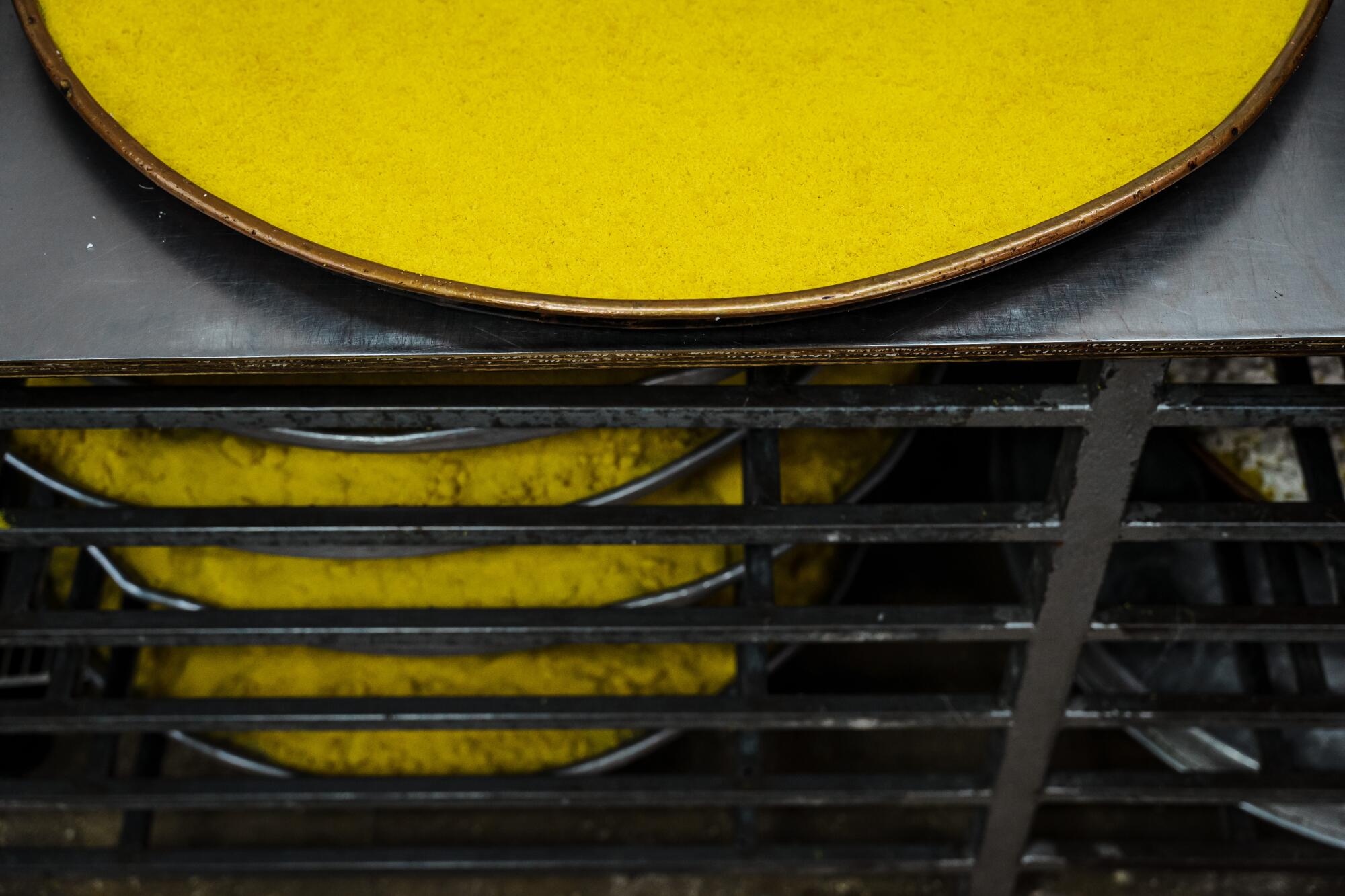
“You’ve forgotten the most important thing,” said Ibrahim Shantir, 32, the shop’s equivalent of the class clown but who turned serious as he pressed the knafeh dough — flour, sugar, turmeric — into a ghee-slathered copper tray, eyeing it to make sure it was level.
“It’s the people,” he said. “All that other stuff doesn’t matter if people can’t come to the place.”
That’s especially true for Nablus, Isleem said, explaining that the city’s merchants mostly relied on visitors to drive the economy.
In normal times, he said, employees crowd into the city from their commuter towns and villages for both work and pleasure. Palestinian Israelis come, too, to amble through the souks of the Old City, buy traditional products like olive oil soap and gorge their way through the city’s embarrassment of rich desserts. Many of the roughly 178,000 Palestinian laborers with Israeli work permits often spend a good portion of their earnings — roughly $100 a day for an unskilled worker, $300 for those with specialized skills — in local shops.
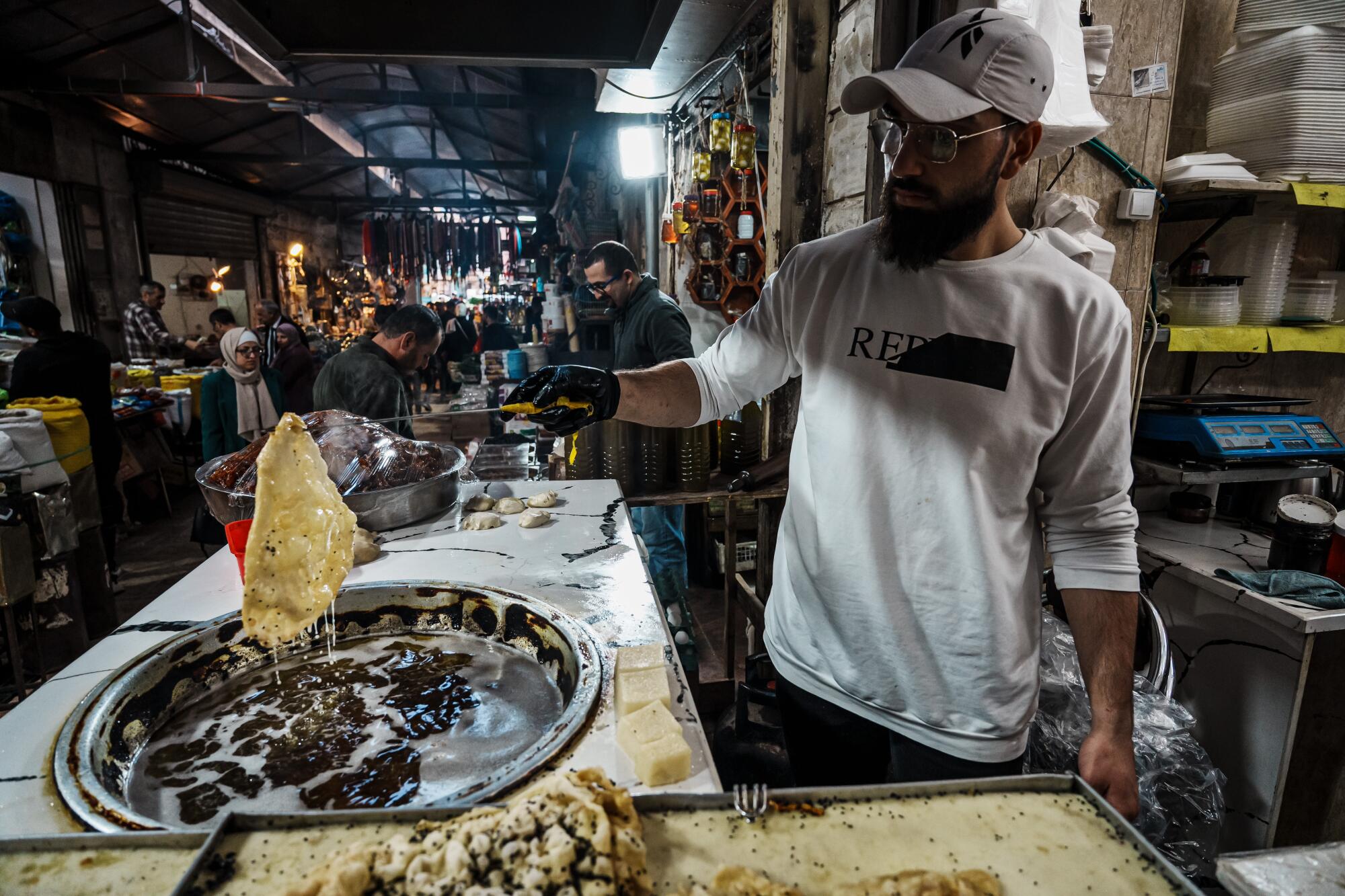
That they’re staying away hints at the tense if not downright dangerous environment Palestinians have faced in the weeks since Oct. 7, with Israeli forces and settlers killing 273 Palestinians — including 63 children — and arresting some 7,800 people in the West Bank, according to Palestinian rights groups. Just last week, the Israeli army entered Nablus’ Old City, one of several incursions in the last two months.
“It’s simple: Unless you have urgent work, why risk coming here? You’ll just stay home,” Isleem said.
Beyond the danger, he added, many Palestinians in the West Bank, watching Gaza’s decimation in real time, on social media and television, are too depressed to go out. Since Oct. 7, when Hamas killed about 1,200 people, Israel has killed 17,900 in Gaza, local health authorities say.
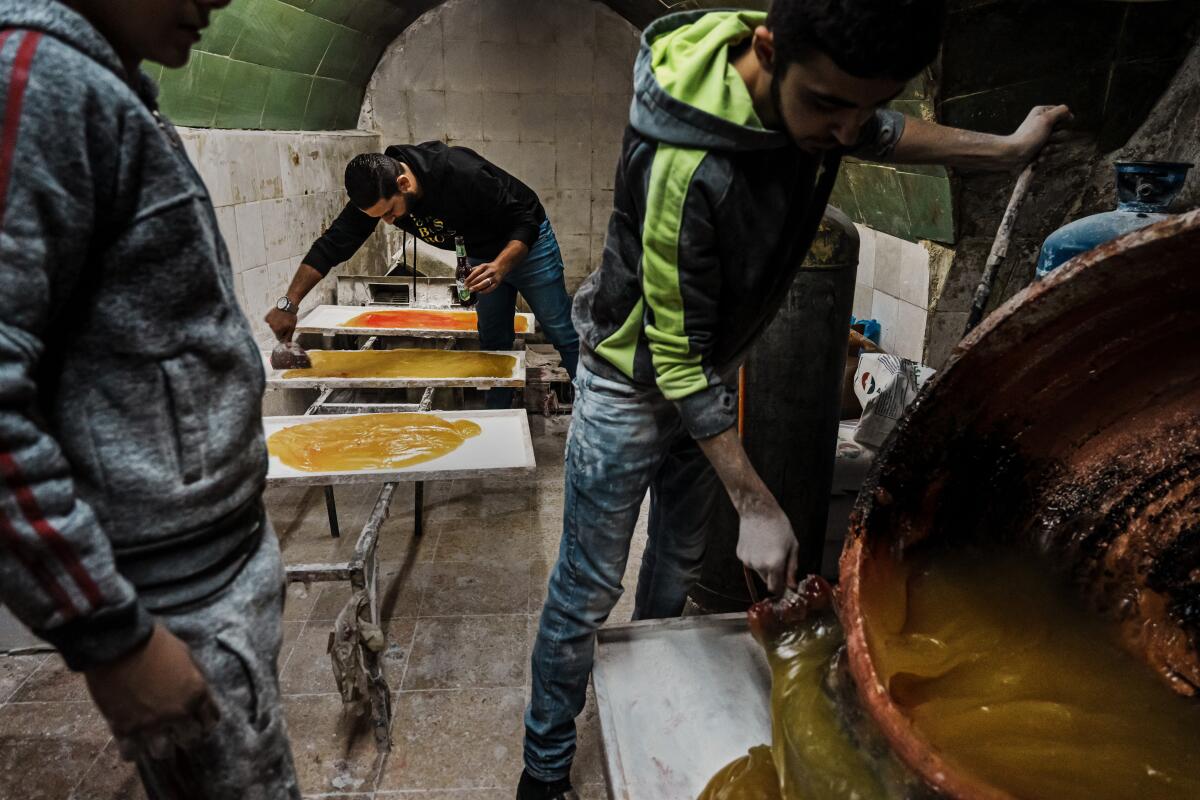
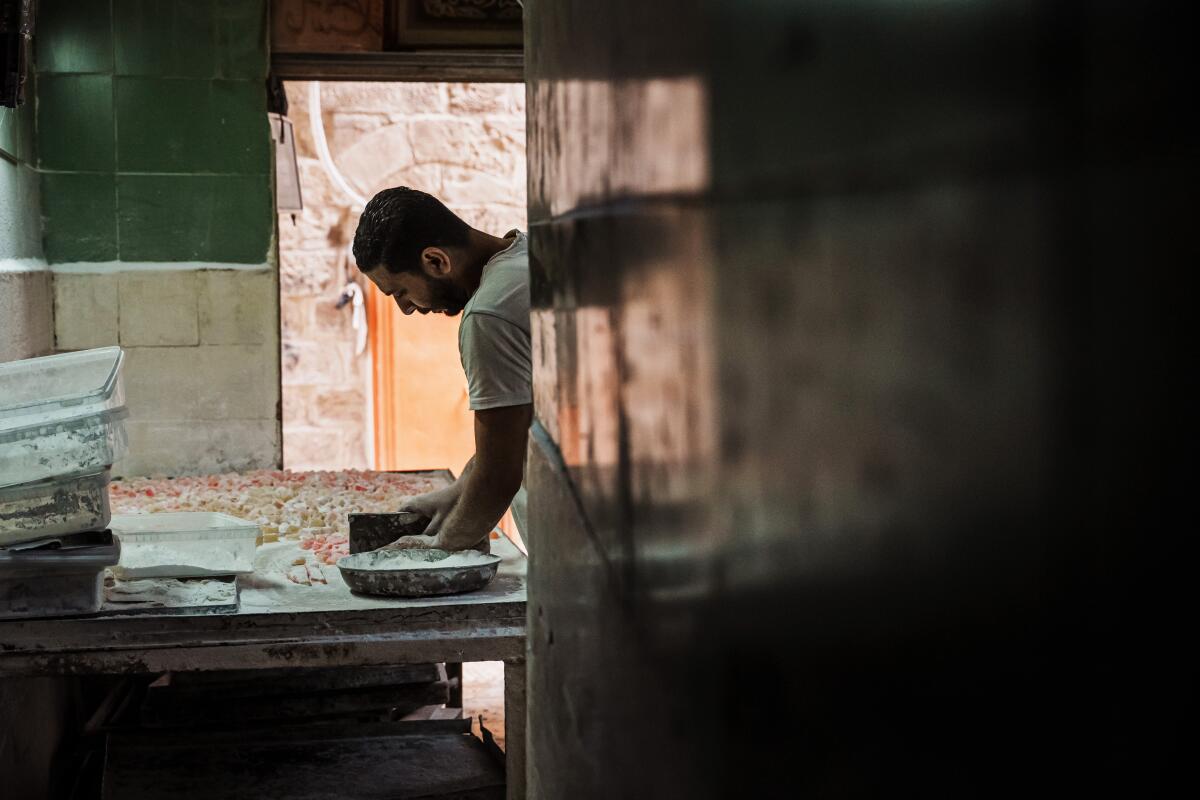
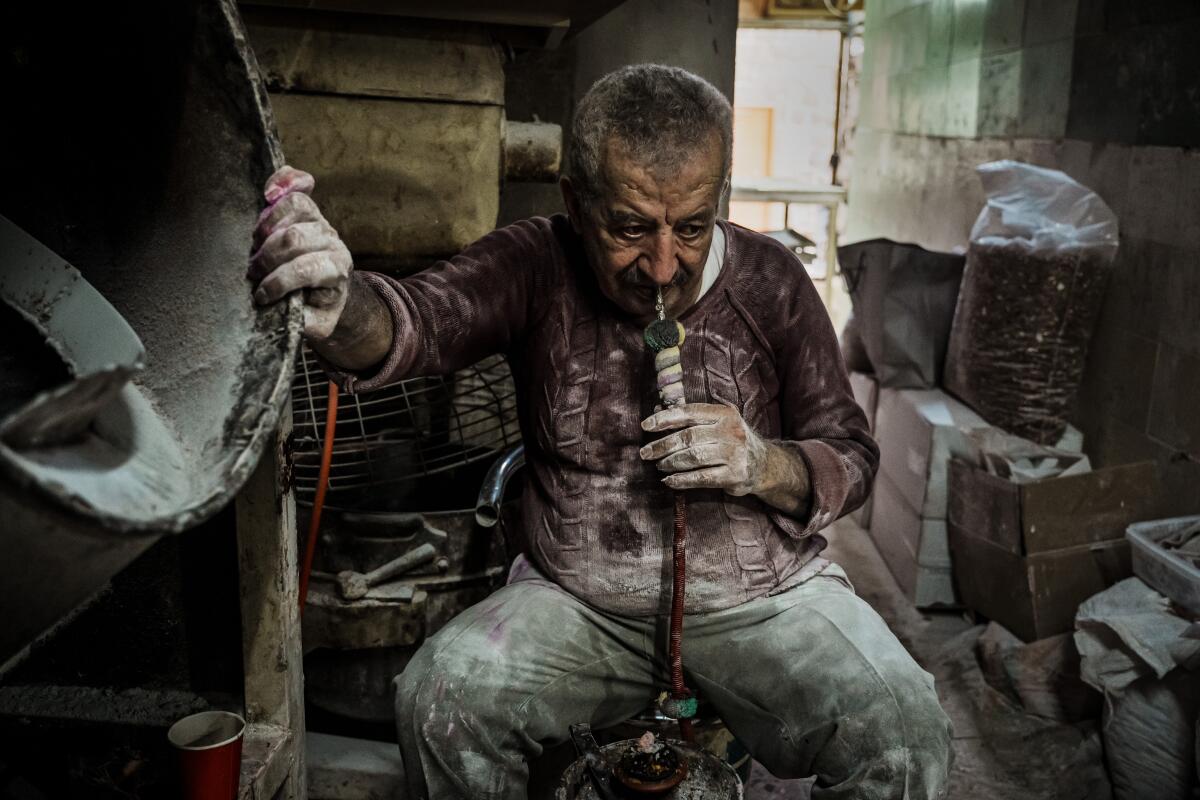
1. Amjad Ayad, in rear, spreads out gelatin for making Turkish delight at his family’s factory in the Old City of Nablus. 2. Amjad Ayad cuts up strips of Turkish delight to be boxed for sale. 3. Saleem Ayad takes a hookah break while waiting for ingredients to boil in a cauldron.
“You see it in everyone’s face. They’re unhappy. Psychologically, how can you enjoy yourself when you see what’s happening in Gaza?” he said.
Another fear is that the all-out Israeli assault on Gaza will soon turn to them.
“We keep hearing the West Bank is next. I doubt it, but you’re always worried about what’s coming,” Anabtawi said.
The mind-set, he added, had shifted to something akin to that during the intifadas in 1987 and 2000, when Palestinians entered an economic deep freeze as they engaged in a sustained mass uprising against Israeli occupation.
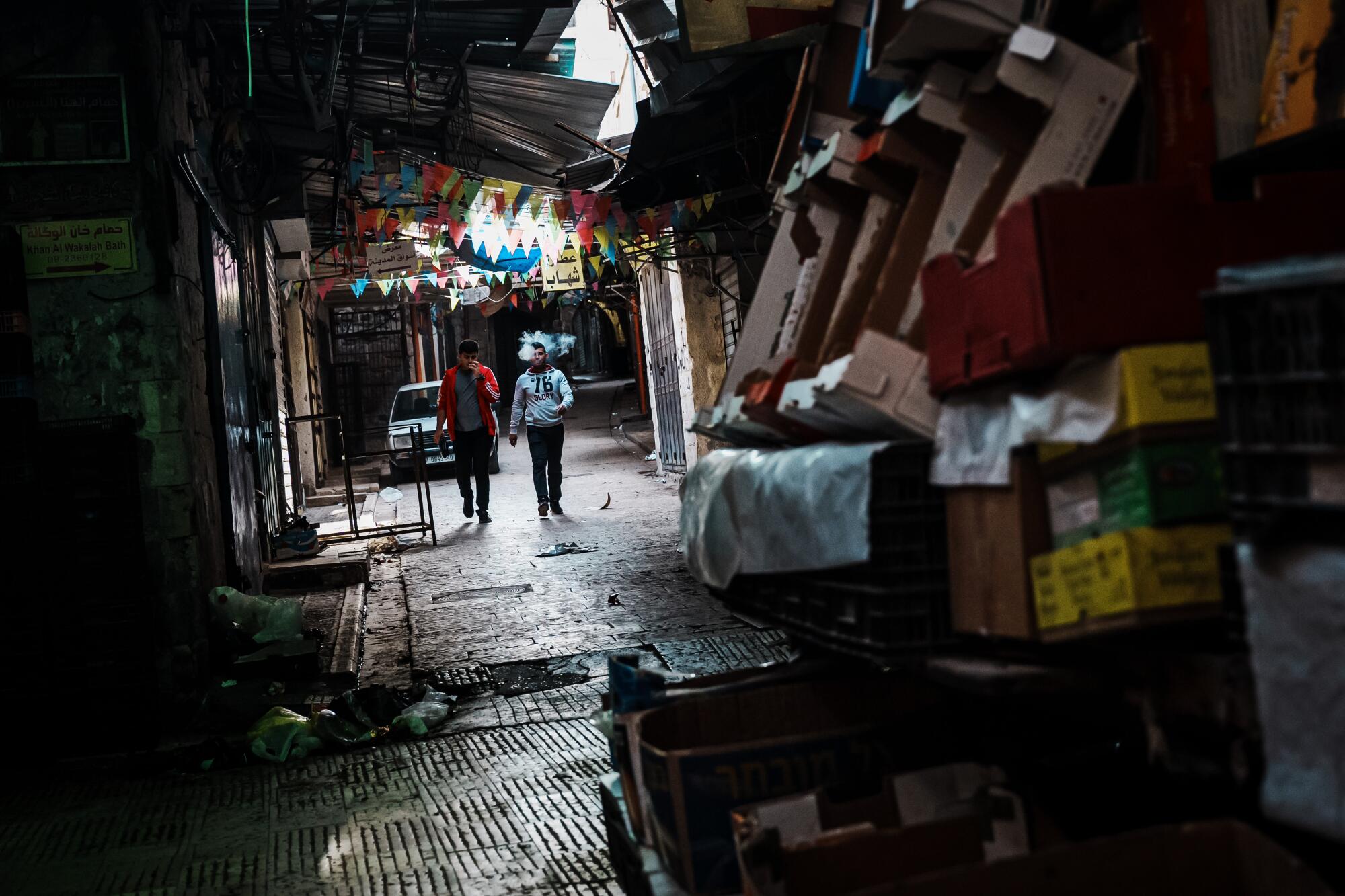
Though the West Bank is so far relatively calm, “people are saving their money. Growth, economy, prosperity — all that’s gone,” Isleem said.
“We’re now in the intifada economy — the economy of caution.”
More to Read
Sign up for Essential California
The most important California stories and recommendations in your inbox every morning.
You may occasionally receive promotional content from the Los Angeles Times.















